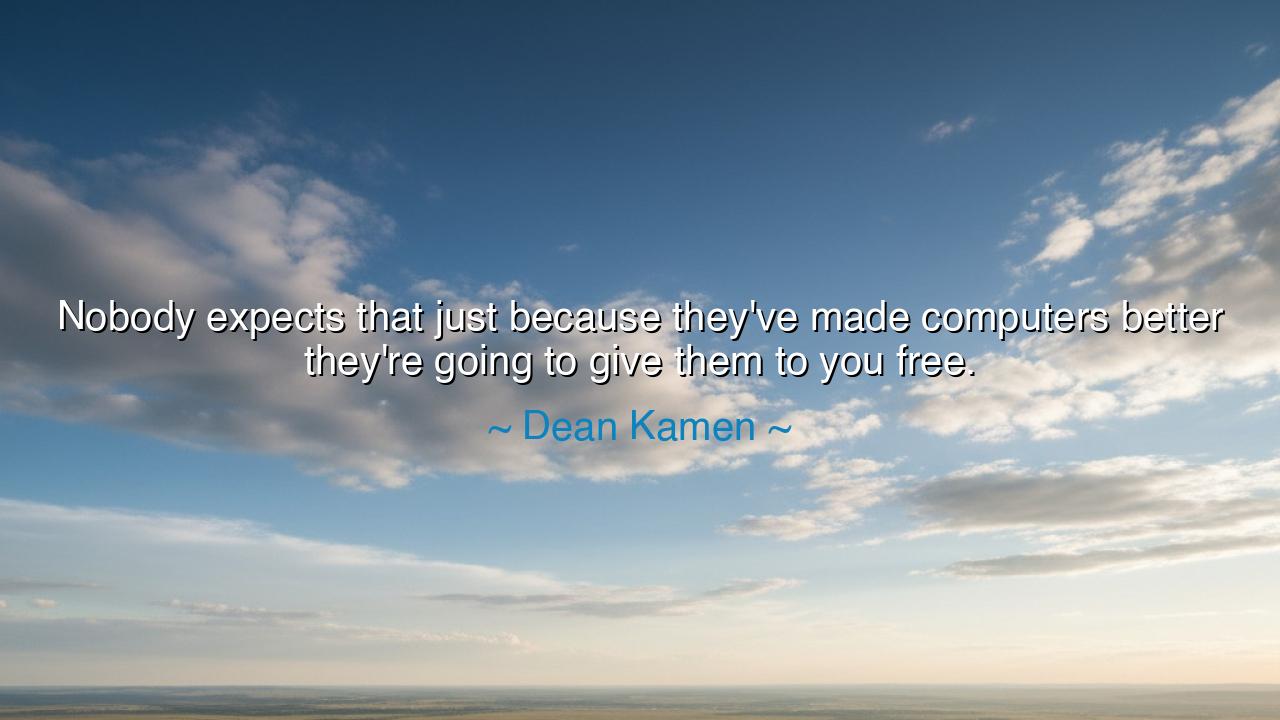
Nobody expects that just because they've made computers better
Nobody expects that just because they've made computers better they're going to give them to you free.






The inventor and visionary Dean Kamen, whose hands have given the world wonders like the Segway and lifesaving medical devices, once spoke a truth both simple and profound: “Nobody expects that just because they've made computers better they're going to give them to you free.” These words, though wrapped in the language of technology, carry a timeless wisdom about progress, effort, and the price of creation. For Kamen speaks not merely of machines, but of human nature—the eternal balance between innovation and ownership, between the generosity of ideas and the labor that brings them into being.
In the ancient days, when craftsmen built with bronze and stone instead of silicon and code, they too knew this truth. The sculptor who carved from marble did not give away his statue merely because his chisel had improved. The farmer who learned to till the soil more efficiently did not scatter his harvest to the winds simply because his plow had become sharper. Improvement has always come with cost; every step forward demands both toil and exchange. What Kamen reminds us of is that progress, though wondrous, does not absolve us of responsibility—it deepens it.
In his age, computers stand as symbols of boundless innovation. Each generation sees them grow faster, smaller, more powerful, yet the human heart often forgets that behind every leap of technology lies the effort of countless minds—the engineers, the builders, the thinkers who spend years perfecting what we call “advancement.” The idea that such achievements should be free is a misunderstanding of both creation and value. Kamen’s statement humbles us, urging gratitude over entitlement, appreciation over assumption.
Consider the story of Thomas Edison, who gave the world the electric light. When the first bulbs flickered to life, they were hailed as miracles. Yet behind their glow lay years of failure, poverty, and sleepless nights. Edison did not stumble upon light—he wrestled it from the darkness through patience and perseverance. When people demanded that such brilliance be cheap or freely given, they failed to see the suffering that gave it birth. Like Edison, Kamen reminds us that invention is sacred work. And sacred work deserves recognition, not exploitation.
In another sense, Kamen’s words warn against the illusion that technological progress automatically brings moral or social progress. We have built machines that think faster, but not hearts that feel deeper. We have created networks that span the globe, but not bonds that unite humanity. If we expect every advancement to come without effort, we forget that progress must be paired with discipline, gratitude, and ethical responsibility. The ancients knew this truth well: Prometheus stole fire from the gods, but mankind paid dearly for the gift because it came without reverence or wisdom.
Yet Kamen’s words are not cynical—they are instructive. They remind us that value is born of sacrifice. If you desire a tool, a skill, or a truth, you must give something of yourself to earn it—your time, your attention, your devotion. In this way, progress becomes a partnership, not a gift. A society that expects creation without contribution risks losing its soul; a people that value effort are the ones who sustain civilization. Computers, no matter how advanced, cannot replace the nobility of human striving.
So let this be the lesson: do not ask that the fruits of progress be free, but rather ask what you may offer to share in their growth. Support the creators, the thinkers, and the builders whose labors shape the future. Give your gratitude to invention, not as charity, but as reverence. And remember that behind every tool that makes life easier lies the unseen sweat of those who dared to make it so.
Thus, Dean Kamen’s words echo like a law of nature itself: nothing worth having comes without cost. If you wish to stand upon the mountains of progress, you must climb them with your own strength. The miracle is not that technology grows—it is that the human spirit, despite the price, continues to create. So, honor the cost, respect the labor, and give thanks for the light that others have kindled—knowing that it was not given freely, but earned through love, endurance, and unyielding faith in the power of human hands.






AAdministratorAdministrator
Welcome, honored guests. Please leave a comment, we will respond soon